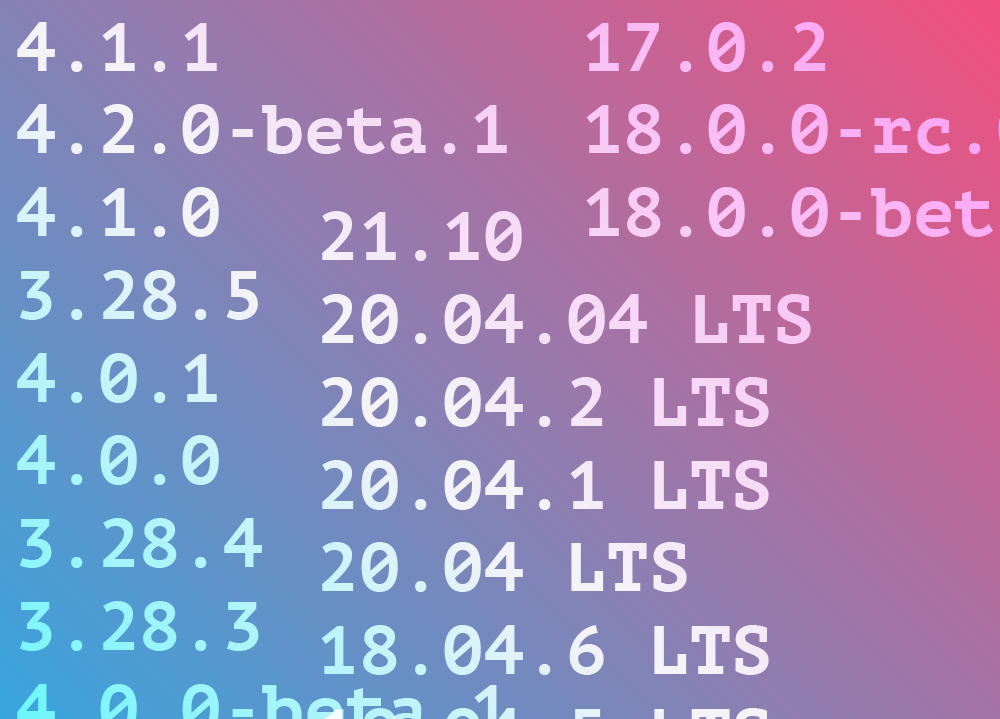Tag: dx

Backstage: Unblock Innersource Development with Plugins and Code Owners.
Navigating the challenges of inner-source Backstage portals? Discover how successful adopters harness code owners to streamline contributions and maintain code quality.
→ Read Article
Taras Mankovski
October 24, 2023

Backstage: How to fix linting errors without slowing down development
In this guide Min will show you a unique approach to tackling a mountain of linting errors without disrupting delivery
→ Read Article
Min Kim
October 16, 2023

Announcing GraphGen: the search for the graph factory
Creating fake datasets that resemble real ones is nearly impossible today. That's why Frontside is working on a tool that can generate graphs with coherent data and relationships
→ Read Article
Charles Lowell
February 21, 2022

When to use SemVer or CalVer: project type considerations
Choosing a versioning scheme helps you manage the understanding and expectations of your project over time. In this article, you'll learn about how to decide on whether to use SemVer or CalVer according to your project type.
→ Read Article
Jacob Bolda
February 9, 2022

What is DX anyway: a chronological overview
You can only optimize for concrete indicators, that’s why having a clear understanding of DX is important to improve it. In this article, we review the main trends of the past decade.
→ Read Article
Jorge Lainfiesta
January 26, 2022

Simplified local development and testing with Auth0 simulation
Auth0 can be difficult to manage in local development and within testing environments such as CI/CD pipelines. An Auth0 simulator can save you from branching your code or maintaining mocks in your tests.
→ Read Article
Paul Cowan
January 13, 2022

Effection: for when async/await is not enough
Everyone who has built a complex system in JavaScript has hit a critical moment when concurrent processes become unmanageable. But with Effection—an OSS async/await alternative—you'll spare memory leaks and headaches.
→ Read ArticleJonas Niklas
October 26, 2021

Relieve developers’ churn in your Cloud native strategy with Backstage
Adopting Cloud native strategies has proven to improve organizations' delivery performance, but the complexity brought in with them is making life harder for developers. Using the example of a unified Secret manager, I present how Backstage can improve DX in the Cloud native world.
→ Read Article
Taras Mankovski
May 14, 2021

Unleashing the Genie: Helping both designers and developers with Storybook
Good documentation is key to design systems. However, what "good" means varies according to the reader. This article will go through tips to generate documentations for designers and developers from a single Storybook—keep everyone happy with minimum effort!
→ Read ArticleVarya Stepanova
April 7, 2021

The context dilemma: design tokens and components
Design tokens are used to keep a consistent look across an entire system. How do you name them semantically if they have to make sense everywhere but also respond to the inner logic of individual components which are independently developed?
→ Read ArticleVarya Stepanova
January 15, 2021

Renaming `main` with purpose
As generic default branch names like `master` for Git repos have gone out of fashion, possibilities emerge for more effective and informative naming conventions. Learn about the branch naming strategy Frontside uses for our Open Source libraries and how we name app project branches.
→ Read Article
Jorge Lainfiesta
December 11, 2020

MirageJS: Choosing the right Serializer
MirageJS ships with four out-of-the-box serializers. In this blog post, we overview the basics of serializers in Mirage, and examine in detail the specific format of each JSON API, Active Model, Rest and generic serializers.
→ Read Article
Min Kim
August 31, 2020

Beyond Mocking: Decoupling teams through Simulation
Decoupling front-end and mobile teams from the back-end makes organizations more effective. In this article we explain why using simulation is an ideal strategy for this purpose, and present important considerations for adopting such practices.
→ Read Article
Charles Lowell, Jorge Lainfiesta
July 29, 2020

The Triple Threat to Testing — Part 2: Reliability
Flakiness: one of the biggest pain-points of any test suite. From app complexity to incident management, we explore some of the most common causes of unreliable tests.
→ Read ArticleRobbie Pitts, Taras Mankovski, Jeffrey Cherewaty, Charles Lowell, Jorge Lainfiesta
April 30, 2020

7 reasons to write good Pull Request descriptions
A good Pull Request description can lead to better reviews, improved solutions, better documentation, and more. In this article, Taras surveys seven big wins of PR descriptions.
→ Read Article
Taras Mankovski
April 15, 2020

The Triple Threat to Testing — Part 1: Speed
Speed, reliability, and relevance constitute the mains pillars of a robust testing strategy. The faster a test suite can diagnose an issue in its application, the more value it renders. In this article, we navigate through the most significant causes of slow tests and suggest ideas to deal with them.
→ Read Article
Charles Lowell, Robbie Pitts, Taras Mankovski, Jeffrey Cherewaty, Jorge Lainfiesta
April 6, 2020